Beloved college coaches reflect on their legacies
By Emmett Burnett
In life and football, great teams, skilled competitors, and excellent coaches are never coincidental.
Nor is it happenstance the state of Alabama has an abundance of winners – leaders of college football, developers of athletes, directors of champions. Here are six college football coaches, where they are now: some retired and some still active in the game. Collectively, they’ve made impressions on thousands.
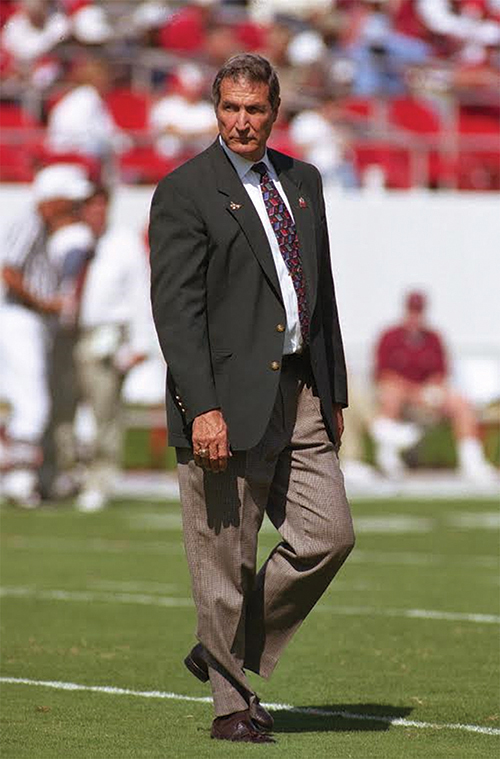 Gene Stallings, University of Alabama
Gene Stallings, University of Alabama
“Can you call back in about two hours?” says Gene Stallings, whose cell phone voice sounds uncannily like Coach Paul Bear Bryant. “I’m right in the middle of baling hay.” Another day on the ranch in Paris, Texas.
“After retiring, Ruth Ann and I moved to Texas,” noted the former University of Alabama head coach, whose 1992, 13-0 season ended with a Sugar Bowl win over the University of Miami. “I have a big garden, about three thousand onions and 54 tomato plants, and we raise cattle, lots of cattle.”
A Texas native, Coach Stallings still has Crimson allegiance. “I watch most Alabama games on TV because it’s a 10-hour drive to Tuscaloosa from here,” he says. “But I still speak there on occasion.” Actually he speaks everywhere on occasion. Coach Stallings is a much sought-after lecturer.
The Stallingses devote time to charities including the Down Syndrome Association, Juvenile Diabetes Foundation, and groups working to feed and provide medical needs to poor and underprivileged.
His coaching record at Alabama, Texas A&M, and pro football teams is epic, but on this interview, not epic enough to compete with hay baling season. “Thanks for calling,” the 81-year-old rancher says, before returning to work. “And thank you for remembering us old coaches!”
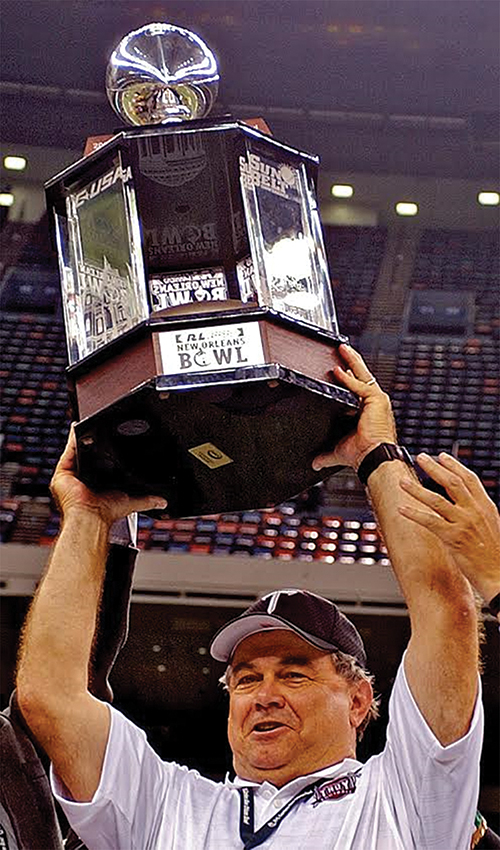 Larry Blakeney, Troy University
Larry Blakeney, Troy University
With 24 seasons at the helm, Troy University’s Larry Blakeney is one of football’s longest serving coaches at one college. Even after retirement, he can be seen at Veterans Memorial Stadium, enjoying the contest, gazing on Larry Blakeney Field, named in his honor. But he is moving on – to Auburn, and closer to family.
“Troy has been a great home for me and Janice,” says the coach and former Auburn quarterback. “We have made many friends and have seen athletes continue growing after leaving the playing field. I had the opportunity to coach some wonderful young men.”
At this writing, Blakeney’s move is not just a job, it’s an adventure. “Most of our stuff is in Auburn, but we have a bare-minimum Troy house,” he says. “And even after the move, we will always be close to Troy.” As for the town he leaves behind, he adds, “It is a great community offering excellent football. I am looking forward to watching Troy University’s continued success.”
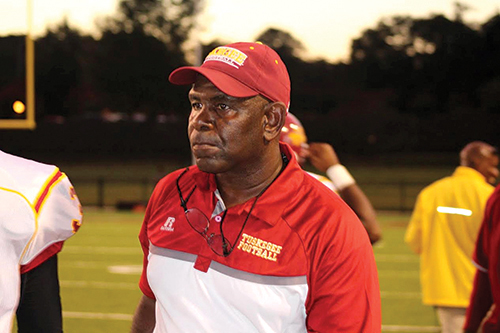 Willie Slater, Tuskegee University
Willie Slater, Tuskegee University
Willie Slater was named Tuskegee University’s head football coach in January 2006. He starts season 11 with a 92-24 record. Almost every year, the Slater trophy case requires extra storage space. But he quickly diverts attention from personal achievements to what he says is the greater reward, his team.
“I enjoy being around these young men,” Slater says. “Too many times lately, college football players and students in general are labeled negatively. But I beg to differ.”
He feels that young people in today’s academia want to be led and learn to lead. “They want to do the right thing,” Slater says. “And I think they see wrongs that are taking place, are fed up with it, and want to make changes for the good.”
When not coaching or recruiting, and that’s not often, Slater enjoys attending and working with Bible Fellowship Apostolic Church in Montgomery. The resident of Shorter is an avid golfer, but presently, his golf clubs are not in full swing. Football season is.
“Unfortunately, right now I can’t play golf as much as I want to.” Putting greens can wait. The gridiron can’t.
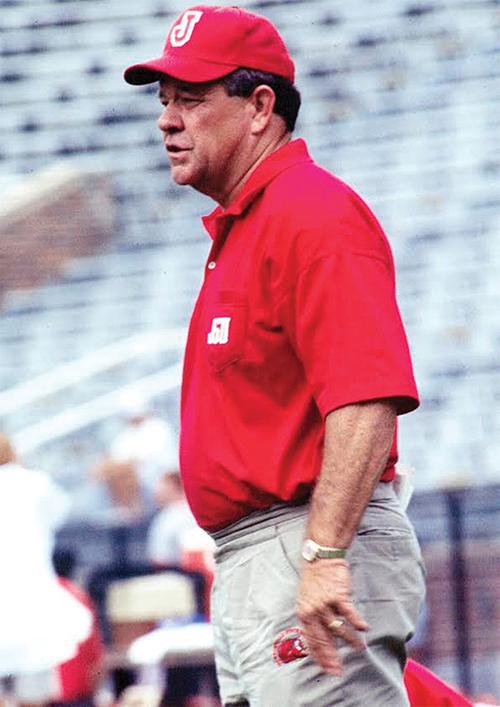 Bill Burgess, Jacksonville State University
Bill Burgess, Jacksonville State University
With the 1985-1996 years at Jacksonville State University, Bill Burgess’ career includes three Gulf South Conference Coach of the Year titles and a 1992 NCAA Division 2, National Coach of the Year recognition. In 1988 the Gamecocks won the Gulf South Conference with a 7-1 record. The next year, the team won the GSC with an 8-0 record, finishing the NCAA as runner- up.
Burgess-Snow Field at JSU Stadium is named for him. “It should have been called ‘Burgess-Snow – And a Whole Bunch of Assistant Coaches Who Made All of This Happen Field,” laughs Burgess. “But they just don’t seem to do that.”
Though a man of many honors, JSU’s coach maintains his self-effacing humor, “I’m retired, I work on the side for Hibbett Sports, but I don’t do much – I’m sure they’ll tell you that.”
He is a devout JSU football follower – from a distance. Referencing his namesake football field, he says, “I don’t go over there much. Mainly, I attend home games, as a fan. It would be butting in. As a coach, my time has come and gone.”
As for the sport, he offers sage advice: “No matter the techniques, training tools, or programs, football will always be a fundamental game. Make the blocks on offense, tackle on defense. It never changes.”
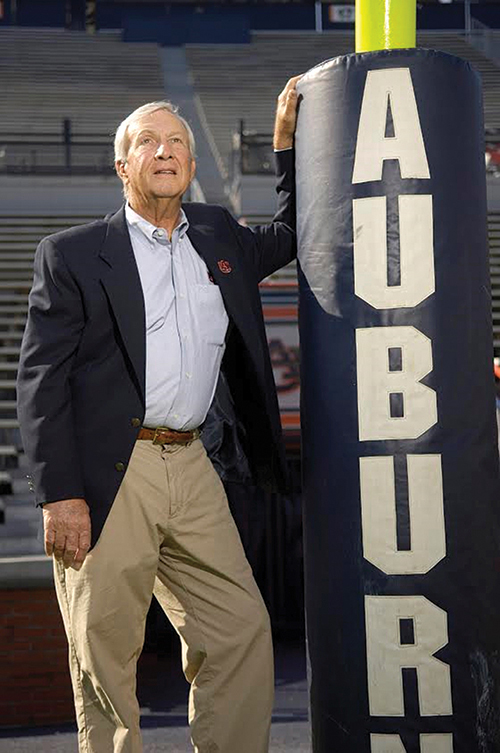 Pat Dye, Auburn University
Pat Dye, Auburn University
The life and times of Pat Dye include helping the Tide Roll, War Eagles soar, and Japanese maple trees grow. He maintains an Auburn office, has written books, hosts a radio show and is a public speaker in demand – and no wonder.
Dye coached under Alabama’s Paul Bryant, was head coach of Auburn University, and a major driver for sharing the Iron Bowl on Auburn’s turf. Today he brings Alabama, Auburn, and other fans together through hunting.
“I am more of their social director,” smiles the coach, referring to his hunting preserve and lodge, Crooked Oaks, in Notasulga. “At the hunt’s end, we will sit around, and I tell stories – but things I want them to hear,” he laughs. “I don’t give anyone a chance to ask questions.”
He also raises and sells Japanese maple trees from nearby Quail Hollow Gardens. “I love to plant and watch the maples grow,” he says. “Trees are a lot like people. Both need attention, especially when young. And to survive, both must have a little sunshine and endure a little rain.”
When asked, “When did you leave Auburn,” Dye pauses, then replies, “I have never left Auburn. I may no longer live there, or actively coach there, but I will always be there.”
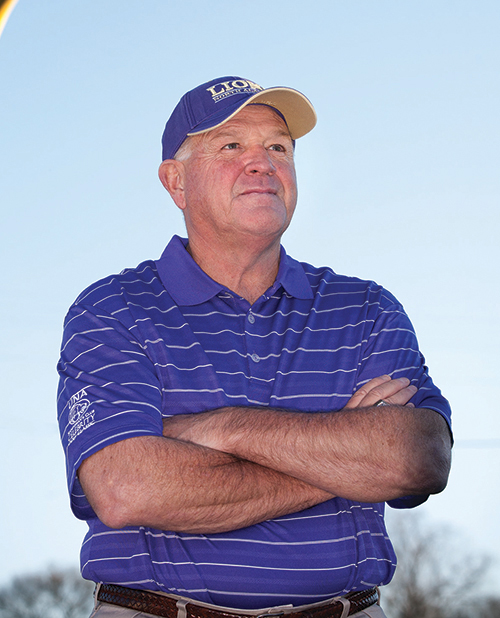 Bobby Wallace, University of North Alabama
Bobby Wallace, University of North Alabama
Bobby Wallace retired from football in 2010, but not for long. He returned to the University of North Alabama in 2012, and he’s loving it.
“One day I will retire,” says the Lions’ head coach. “Sharon and I have a place on Lake Martin, grandkids, and sure, I’m looking forward to retiring, one day.” But not today.
Wallace originally coached UNA from 1988-97, racking up three straight NCAA Division II National Championships and an 82-36-1 record. He left in 1997, coaching Temple University and then the University of West Alabama.
But the Lions of Florence called him home. “Of course, I love football,” he says, from the UNA campus. “But it is so much more – the camaraderie with other coaches and players, the competitiveness, all of us working to achieve a common goal. That’s college football to me.”
He adds, “I know I can’t do this forever, but as long as I am in good health, and we are successful, I will continue, and enjoy what I do.”
As fans, we will continue enjoying what our state’s coaches do, too.




